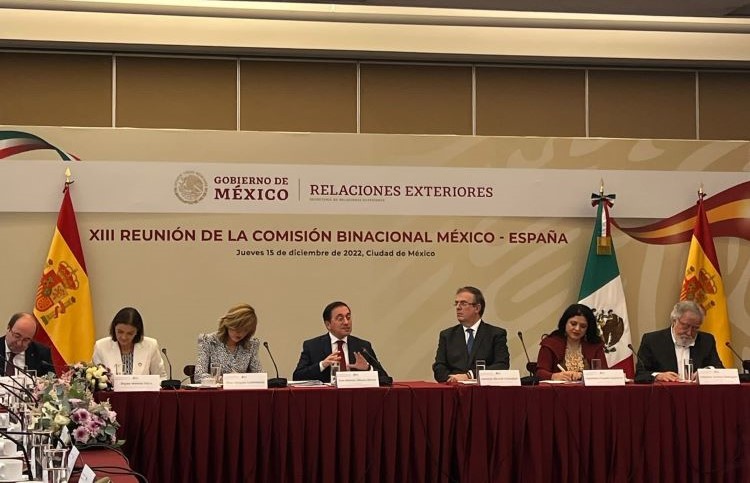Eduardo González
The Foreign Ministers of Spain and Mexico, José Manuel Albares and Marcelo Ebrard, chaired yesterday in the Mexican capital the XIII Meeting of the Binational Commission, the main regular framework of bilateral relations, in the course of which cooperation in areas as diverse as science, culture, education, aid to Central America or defense was addressed.
“Spain does not have a forum like this with any other country in the world,” declared Albares during the joint press conference with Ebrard that closed the meeting. “This binational commission is the mechanism that articulates our bilateral relations and that demonstrates the specificity of Mexico’s relationship for Spain, and it is also the temperature of how our relationship is going and that demonstrates that our bilateral relationship is in excellent health,” he continued.
The Binational Commission had not met since 2017 and the thirteenth edition was scheduled for 2020, but was not possible because of the pandemic. Under the 1990 General Treaty of Cooperation and Friendship between Spain and Mexico, the Commission is held biannually and alternately in one of the two countries. Apart from Albares, the Spanish delegation included the Minister of Education and Vocational Training, Pilar Alegría; the Minister of Industry, Trade and Tourism, Reyes Maroto; the Minister of Culture and Sports, Miquel Iceta; and the Minister of Universities, Joan Subirats.
During the meeting of the Commission, held at the headquarters of the Secretariat of Foreign Affairs in Mexico City, the two governments addressed “political, economic, financial, consular, scientific-technical cooperation, education, culture and defense matters”, which has translated into “very concrete results”, explained Albares.
For example, he said, “through the Joint Fund for Technical and Scientific Cooperation, we are going to relaunch cooperation projects in Mexico and with Mexico, especially in Central America”. Likewise, “the future presence of Spain as guest of honor at the Guadalajara International Book Fair in 2024, which is a real honor for Spain” (Iceta had a meeting with Raúl Padilla López, the president of the Fair, “the most important literary event of Hispanic literature, which has just been held, recovering pre-pandemic figures”) and an agreement was reached to “organize in Spain an exhibition of pre-Hispanic cultures of Mexico”.
In addition, Albares continued, “we have delved into global strategic issues that affect both countries in different areas, such as migration, bilateral legal cooperation and the field of defense, cybersecurity and military intelligence”, and he himself told Ebrard “that during the Spanish Presidency of the Council of the EU, which is six months away, we are going to push for Latin America’s presence in the heart of Europe and for issues such as the Global Agreement between Mexico and the EU to move forward and be signed so that it can be mutually beneficial, which is six months away, we are going to push for the presence of Latin America in the heart of Europe and that issues such as the Global Agreement between Mexico and the EU can move forward and be signed so that it can be mutually beneficial, as recently happened with the EU-Chile agreement or as we also want to do with the Mercosur agreement”.
Regarding this point, Reyes Maroto declared in the morning, during a breakfast with businessmen at the Spanish Chamber of Commerce in Mexico -which was also attended by Albares-, that Spain wants to “accelerate the negotiations so that the modernized Global Agreement between the European Union and Mexico enters into force, along the same lines as the one approved a week ago with Chile”, so that “it can enter into force during the Spanish presidency of the Council of the European Union, in the second half of 2023”.
For his part, Marcelo Ebrard declared during the press conference that the Binational Commission had been “a great success, without a doubt”, because it “will allow us to move forward very soon, quickly and at a good pace in the bilateral relationship” and had allowed us to agree on “common actions and reactivate the cooperation network we have between both countries, which includes science, culture, common actions in Central America and investments”. “We have also made an analysis of the most urgent matters, from the consular, strategic, universities, research centers, education, common values and gender equality,” he continued.
López Obrador and the “pause” in relations
Likewise, Ebrard assured that the President of Mexico, Andrés Manuel López Obrador, had personally expressed his “great pleasure” for holding the Binational Commission. Yesterday’s meeting was precisely the first meeting of this body -the main regular framework for bilateral relations- since the coming to power of López Obrador, whose presidency has been characterized, among other things, by his constant verbal attacks on Spain and its companies.
Last February, the Mexican president went so far as to propose a “pause” in relations with Spain to turn the page on a period in which, in his opinion, Spanish authorities and companies took advantage of his country. These words provoked a new crisis in bilateral relations, which Albares himself tried to redirect by traveling to Mexico City to meet with Ebrard.
Albares himself referred to that incident during yesterday’s press conference, in response to a question from a local journalist: “It is impossible to pause relations between Spain and Mexico, it is impossible to pause relations between two brothers, it is impossible to pause relations between so many thousands and thousands of Spaniards and Mexicans who cross the Atlantic every year to work, for university exchanges or for business activities”, he declared.







